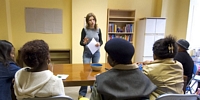Yes, it is disheartening, go ahead and scream. Just when you thought you had left those pesky acne problems behind with the teenage years, here it rears its ugly head to haunt you in the adult years - but why?
Did you know that, according to the American Academy of Dermatology, adult acne occurs in approximately 80 percent of people in their 20s and 30s? This includes about 17 million people of all ages who suffer with this skin disorder. And, it is a fact that women suffer from acne more often than men. However, adult acne is still a serious widespread problem for men as well.
What Causes Adult Acne?
Acne is the official name for a skin disorder that many refer to as pimples that pop up on our skin and sometimes underneath the skin. So what, exactly, are pimples and what causes them? Well, basically, pimples are skin growths that are comprised of dead skin cells, oil and bacteria which clog pores and cause the hair ducts to become inflamed. These pimples can be in the form of blackheads (bumps that are open to the air, but embedded in the skin and can be black or yellowish in color), or whiteheads (white-colored bumps that are closed). Whiteheads can be very sore, and if they burst, can cause the infection which leads to nodular or cystic acne problems, as well as scarring.
Other factors that can affect that skin and cause acne to be more problematic for women include, stress and hormonal fluctuations (which can make the skin's oil glands overact), some cosmetics (which can clog pores), and also dirty cosmetic sponges which can harbor bacteria which can lead to acne when used on the face. For men, adult acne can be a bit more severe than that in women because of testosterone levels, men can get acne from hormonal changes as well.
Common Treatment Options
Treatment options are varied and the correct choice for treatment of your acne depends on what type of acne you have and how severe it is. Sometimes acne problems can be treated with topical medications or prescriptions (including antibiotics for more severe cases), but make sure you ask your doctor to inform you of any risks and possible side effects. Natural or home remedies, such as using tea tree oil has worked well for some people. Laser treatments, such as chemical peels, microdermabrasion or resurfacing are also being used to treat acne. But, again, make sure you are made aware of risks and side effects, and be sure to use only a board certified specialist for laser procedures.
Alternative Treatment Options
If you are weary of taking prescription medicine or undergoing laser treatments to try and eliminate your acne, you may consider herbal remedies which have helped countless people to get rid of acne.Adult acne is arguably the most common skin disorder imaginable. However, all hope is not lost in being acne free, if you follow the right diet and skin care regimen.
I'm Audrey Malone and I have been acne-free for over 4 years now, and you can quickly get rid of your acne too with an acne-free diet and skin care regimen that works just by visiting: a popular site with information on how to get rid of acne for good.



